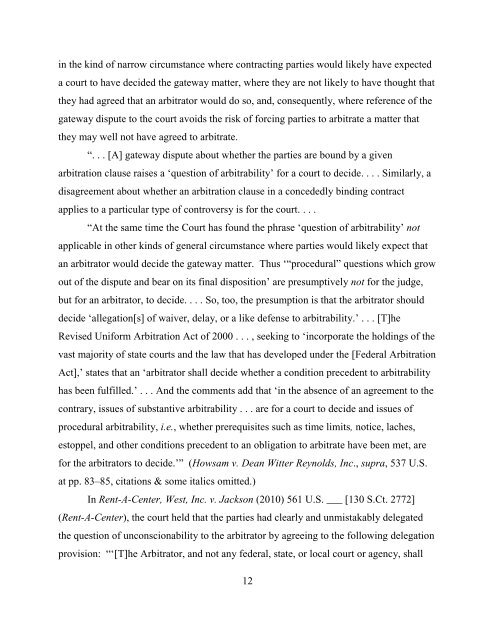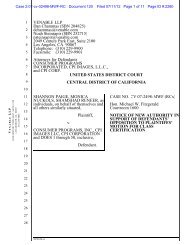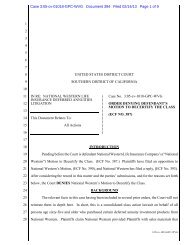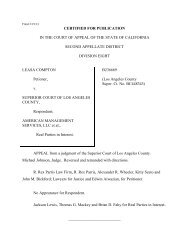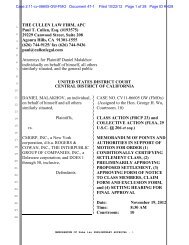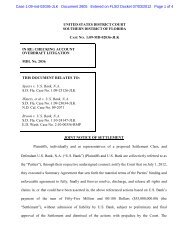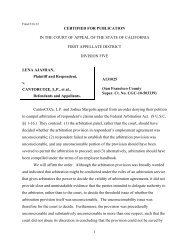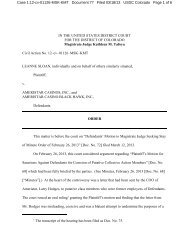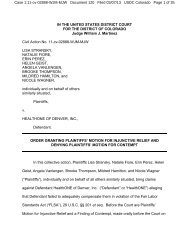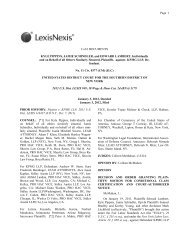here - FindLaw
here - FindLaw
here - FindLaw
Create successful ePaper yourself
Turn your PDF publications into a flip-book with our unique Google optimized e-Paper software.
in the kind of narrow circumstance w<strong>here</strong> contracting parties would likely have expected<br />
a court to have decided the gateway matter, w<strong>here</strong> they are not likely to have thought that<br />
they had agreed that an arbitrator would do so, and, consequently, w<strong>here</strong> reference of the<br />
gateway dispute to the court avoids the risk of forcing parties to arbitrate a matter that<br />
they may well not have agreed to arbitrate.<br />
―. . . [A] gateway dispute about whether the parties are bound by a given<br />
arbitration clause raises a ‗question of arbitrability‘ for a court to decide. . . . Similarly, a<br />
disagreement about whether an arbitration clause in a concededly binding contract<br />
applies to a particular type of controversy is for the court. . . .<br />
―At the same time the Court has found the phrase ‗question of arbitrability‘ not<br />
applicable in other kinds of general circumstance w<strong>here</strong> parties would likely expect that<br />
an arbitrator would decide the gateway matter. Thus ‗―procedural‖ questions which grow<br />
out of the dispute and bear on its final disposition‘ are presumptively not for the judge,<br />
but for an arbitrator, to decide. . . . So, too, the presumption is that the arbitrator should<br />
decide ‗allegation[s] of waiver, delay, or a like defense to arbitrability.‘ . . . [T]he<br />
Revised Uniform Arbitration Act of 2000 . . . , seeking to ‗incorporate the holdings of the<br />
vast majority of state courts and the law that has developed under the [Federal Arbitration<br />
Act],‘ states that an ‗arbitrator shall decide whether a condition precedent to arbitrability<br />
has been fulfilled.‘ . . . And the comments add that ‗in the absence of an agreement to the<br />
contrary, issues of substantive arbitrability . . . are for a court to decide and issues of<br />
procedural arbitrability, i.e., whether prerequisites such as time limits, notice, laches,<br />
estoppel, and other conditions precedent to an obligation to arbitrate have been met, are<br />
for the arbitrators to decide.‘‖ (Howsam v. Dean Witter Reynolds, Inc., supra, 537 U.S.<br />
at pp. 83–85, citations & some italics omitted.)<br />
In Rent-A-Center, West, Inc. v. Jackson (2010) 561 U.S. ___ [130 S.Ct. 2772]<br />
(Rent-A-Center), the court held that the parties had clearly and unmistakably delegated<br />
the question of unconscionability to the arbitrator by agreeing to the following delegation<br />
provision: ―‗[T]he Arbitrator, and not any federal, state, or local court or agency, shall<br />
12


